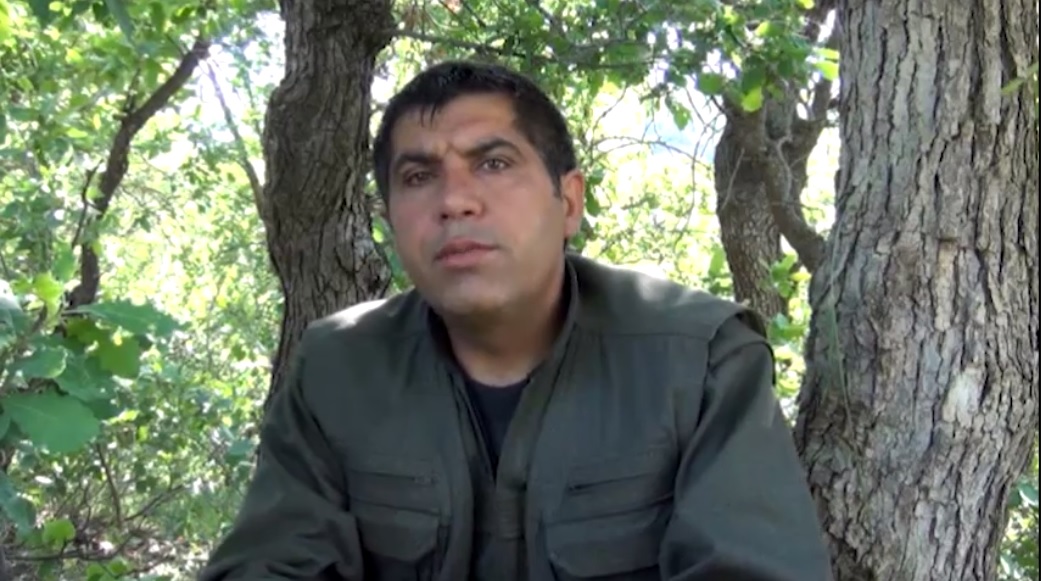PKK claims death of commander, as Turkish raid stirs Ankara-Baghdad tensions
The Kurdistan Workers' Party (PKK) announced Thursday that a Turkish drone strike in the Kurdistan Region two days before had killed one of its top commanders shortly after a meeting with Iraqi army personnel, three of whom also perished in the attack.

ERBIL (Kurdistan 24) – The Kurdistan Workers' Party (PKK) announced Thursday that a Turkish drone strike in the Kurdistan Region two days before had killed one of its top commanders shortly after a meeting with Iraqi army personnel, three of whom also perished in the attack.
Agid Garzan, the head of what the PKK refers to as its Khawakurk axis in the Kurdistan Region, was "martyred on August 11 along with Iraqi military officials as a result of the Turkish bombing," a statement from the group said. It noted that Garzan, whose real name is Murad Kalo, was born in 1975 and joined the armed organization in 1993.
Read More: Turkish airstrike in Kurdistan Region kills 2 Iraqi border guard commanders
Ankara’s newest offensives along the Turkish and Iranian borders against the PKK, which is based in the Kurdistan Region's Zagros Mountains, began in mid-June. The so-called Claw-Eagle and Claw-Tiger operations, as the Turkish army has dubbed them, have led to several civilian casualties.
The PKK is engaged in a decades-long insurgency against Turkey over Kurdish rights and self-rule that has resulted in the death of over 40,000 people on both sides. Ankara considers the armed group and its affiliates terrorist organizations.
The Iraqi government has repeatedly condemned the killing of and attacks on innocent bystanders by the Turkish army, which appears to reject the notion any civilian casualties have occurred directly from its actions. Baghdad has also demanded that Ankara withdraw its forces on multiple occasions, to no avail.
The latest Turkish attack, which happened briefly after a meeting in Erbil’s Bradost area between delegations from the PKK and Iraqi border guards to ease brewing tensions, led to a round of condemnations from top Iraqi government officials. The president, Barham Salih, described it as a “flagrant” act of aggression.
On Wednesday, the Iraqi foreign ministry sent the Turkish ambassador to Baghdad a protest note that said it holds Ankara “responsible for this sinful attack,” and demanded “the Turkish side to clarify its circumstances hold the perpetrators accountable.”
The ministry on Tuesday canceled all visits by Turkish officials in response to the incident. It also stated that Turkey’s continued “violations” and refusal to withdraw its forces from Kurdistan Region territory “calls for a review of the volume of cooperation between the two countries at various levels.”
Baghdad also affirmed that Iraq should not be used as a launchpad for attacks on neighboring countries or an arena for “settling scores” between different warring parties.
The Iraqi national security council held a discussion on the incident on Wednesday. It also described the killings as “a major violation” of neighborly relations and “a major threat to Iraqi national security and the stability of the region."
The body, led by prime minister Mustafa al-Kadhimi, added that “Iraq will exercise” all the means available to it “to defend its security and protect its citizens." It also requested the foreign minister, Fuad Hussein, to seek aid from the international community and Arab countries to exert diplomatic pressure on Turkey for the attack.
Hussein later said he had contacted Egyptian, Jordanian, Saudi and Kuwaiti counterparts as well as the Arab League to seek their diplomatic support in confronting Ankara, AFP reported. He pleaded for "major Arab efforts to avoid dangerous developments" and for "a united position to force Turkey to pull out its troops who have infiltrated into Iraq."
On Wednesday, the deputy speaker of the Iraqi parliament, Hassan Kaabi, even called on the UN Security Council to "urgently intervene to stop the recurring violations and to affirm respect for the principles of good neighborliness."
In a show of support for Iraq, the French foreign ministry said on Thursday it “deplores this serious development, on which all light must be shed.” It added that “France is deeply attached to full respect for Iraqi sovereignty. France condemns any violation of this sovereignty.”
Paris and Ankara have been locked in tensions as Turkey expands extraterritorial activities, including in Syria—where Turkey backs various militant groups against the Syrian regime and Kurdish-led forces—, Libya, and the Eastern Mediterranean.
The UAE foreign ministry also denounced the attack, saying Abu Dhabi rejects “regional meddling in Arab affairs.”
Turkey, however, appears unfazed by the killings, with its foreign ministry saying on Wednesday—a day after the incident—that the country is “determined to take the necessary measures for the security of its borders, wherever it may be.”
Indeed, late Thursday suspected Turkish planes struck a vehicle and killed three suspected PKK fighters, according to initial reporting. Another passenger is reportedly missing.
The pro-Turkish government Daily Sabah explained that the air force had also killed nine PKK fighters earlier in the week in separate operations, but also claimed that one strike “unintentionally” killed two Iraqi military officers.
“It is Iraq's responsibility to take necessary measures against PKK elements on its territory,” the Turkish ministry added.
“Our country is ready for cooperation with Iraq on this issue,” it said, concluding with an ultimatum: “If the PKK presence in Iraq continues to be ignored, then we are determined to take any step anywhere for our border security.”
Editing by John J. Catherine